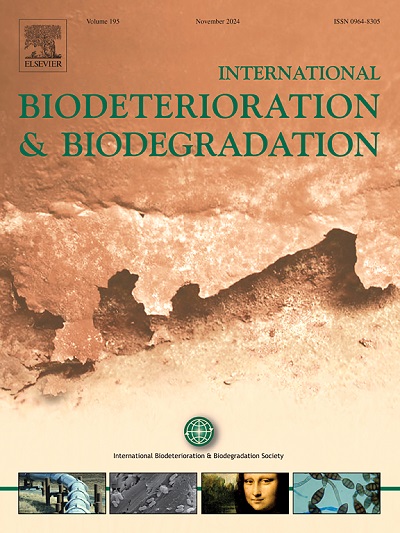通过环境和生物技术应用的多转录因子工程增强酿酒酵母对工业抑制剂的耐受性
IF 4.1
2区 环境科学与生态学
Q2 BIOTECHNOLOGY & APPLIED MICROBIOLOGY
International Biodeterioration & Biodegradation
Pub Date : 2025-04-16
DOI:10.1016/j.ibiod.2025.106099
引用次数: 0
摘要
本研究提出了一种增强酿酒酵母对工业抑制剂耐受性的新方法,这些抑制剂包括糠醛、5-羟甲基糠醛(HMF)、乙酸、甲酸、无水乙醇和苯酚。通过共同表达转录因子 PDR1、YAP1 和 RPN4,工程酵母菌株表现出显著的抗逆性,与亲本菌株相比,滞后期更短,生长率更高。RNA 测序显示,涉及 NADPH 再生、氧化还原平衡和细胞膜稳定的关键基因上调,而蛋白质修饰基因下调则表明这是一种高能效的氧化应激管理策略。这些研究结果表明,多转录因子工程有可能改善酵母菌株在有毒条件下的表现,对工业生物乙醇生产和环境污染物降解具有重要意义。未来的研究重点应是优化这些菌株,使其应用于更广泛的工业领域,包括扩大发酵过程的规模,以提高生物乙醇产量和改善环境。本文章由计算机程序翻译,如有差异,请以英文原文为准。

Enhanced tolerance of Saccharomyces cerevisiae to industrial inhibitors through multi-transcription factor engineering for environmental and biotechnological applications
This study presents a novel approach to enhance the tolerance of Saccharomyces cerevisiae to industrial inhibitors, including furfural, 5-hydroxymethylfurfural (HMF), acetic acid, formic acid, anhydrous ethanol, and phenol. By co-overexpressing the transcription factors PDR1, YAP1, and RPN4, engineered yeast strains exhibited significantly improved stress resistance, with shorter lag phases and higher growth rates compared to parental strains. RNA sequencing revealed upregulation of key genes involved in NADPH regeneration, redox balance, and cell membrane stabilization, while downregulation of protein modification genes suggested an energy-efficient oxidative stress management strategy. These findings demonstrate the potential of multi-transcription factor engineering to improve yeast strain performance under toxic conditions, with important implications for industrial bioethanol production and environmental pollutant degradation. Future research should focus on optimizing these strains for broader industrial applications, including scaling up fermentation processes to enhance bioethanol yield and environmental remediation.
求助全文
通过发布文献求助,成功后即可免费获取论文全文。
去求助
来源期刊
CiteScore
9.60
自引率
10.40%
发文量
107
审稿时长
21 days
期刊介绍:
International Biodeterioration and Biodegradation publishes original research papers and reviews on the biological causes of deterioration or degradation.

 求助内容:
求助内容: 应助结果提醒方式:
应助结果提醒方式:


